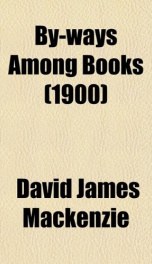by ways among books

Purchase of this book includes free trial access to www.million-books.com where you can read more than a million books for free. This is an OCR edition with typos. Excerpt from book: JOHN KEATS /'N the year 1817 there appeared a small volume of 1 poems, which did not attract much attention. It ' was the work of a young man of 22 years of age. Less than four years afterwardsin February 1821 that young man died at Rome, where he had gone in the vain hope of recovering his lost health. In these four years, surely as short a time as was ever given to mortal to work out a literary immortality, John Keats managed, by the force and splendour of his poetic genius, to rank himself among the great personalities of English literature. It was only a few years ago that another great and kindred spirit passed away ; but how different was his fortune ! Lord Tennyson had reached the full limit of ordinary human life, his career had been peaceful, rich with great accomplishment, and crowned with well-won honour. Looking to what we owe to Tennyson, we cannot help asking ourselves Had Keats lived, how much richer and fuller might our literature have been ? It is idle to speculate on such questions, but the fact remains that there is no critic of real insight who will for a moment doubt that his brief life was but a glimpse into a great treasure house which death untimely closed to us; but a fragment, like one of those exquisite torsos of ancient Greeksculpture which confound our imaginations with dreams of what may have been their finished form. To some minds Keats may not seem worthy of such praise as I have already given him. Fortunately, our tastes are various in this world. It would be a much duller place than it is if we all thought alike. But even to those who deny Keats the laurel of immortality it must at least be evident that the English literature of the nineteeth century has been largely influenced by his style, and that heboy as he wasforms one of the hin...
Info about the book
Author:
Series:
Unknown
ISBN:
0754642380
Rating:
3/5 (2)Your rating:
0/5
Languge:
English
Users who have this book
Users who want this book
What readers are saying
What do you think? Write your own comment on this book!
write a commentif you like by ways among books try:
Other books by this author
Do you want to read a book that interests you? It’s EASY!
Create an account and send a request for reading to other users on the Webpage of the book!

